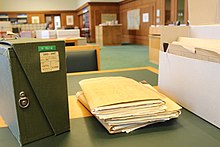Total Digital Access to the League of Nations Archives Project
The Total Digital Access to the League of Nations Archives Project, or LONTAD is a grant-funded large-scale digitization project to digitize, preserve, and provide online access to the archives of the League of Nations. Its fundamental aim is to modernize access to the archives for researchers, education institutions, and the general public. The project will result in 250 terabytes of data (nearly 30 million digital files), over 500,000 units of descriptive metadata, and the rehousing, preservation and conservation of the physical archives (nearly 3 linear kilometers).[1][2][3][4] The project is managed by the Institutional Memory Section (IMS) of the Library of the United Nations Office at Geneva.[5] Launched in 2017, it is scheduled for completion in 2022.[6][7]
League of Nations archives
The League of Nations archives consists of approximately 15 million pages of content dating from the inception of the League of Nations in 1919 extending through its dissolution, which commenced in 1946.[6] The collection is housed at the United Nations Office at Geneva, and is considered to be a historical collection of the United Nations Archives at Geneva.[8][5]
Project operations
Within the focus of digitization, digital and physical preservation, and online access, the project is divided into the three major operations: Pre-digitization, Scanning, and Post-digitization. Each component includes its own specialized team.[9][10]
Pre-digitization

Pre-digitization activities are primarily concentrated on physical preparation and preservation treatment. The Pre-digitization Team performs repairs and stabilization of torn paper, secures materials in preservation enclosures to ensure their longer-term stabilization, and isolates any photographs with photo-safe preservation paper. The archives are then sorted, ordered, and indexed according to project standards, and inventoried in the archives management system.[11]
Scanning
LONTAD works closely with an external specialized company for scanning. Overhead scanners designed for cultural heritage digitization are used. Both a master file (JPEG-2000 format) and an access file (PDF) processed with OCR are produced and delivered to the Post-digitization Team.[11]
Post-digitization
Post-digitization activities are primarily centralized on quality control and metadata creation. The Post-digitization Team performs quality control on scanned images. Physical quality control is also performed on a sample of materials in order to ensure long-term preservation.[11]
Metadata creation consists of archival description and indexing. The descriptive metadata generated serves as the key component to providing access to the digital collection. The Post-digitization Team also works to standardize and document description processes, and uses the MoSCoW method for quality control and metadata correction.[11][12]
The Post-digitization Team ensures online publishing to the digital access system, ingests the digital files to the digital preservation system, and coordinates some of the project outreach functions, such as Twitter and the project mascot Lontadinho.[11][13]
Research objectives
The LONTAD project aims to make the League of Nations archives more accessible to researchers. It seeks to do this in the framework of three research objectives: mobilizing knowledge and providing global access; providing uniform and complete access via archival description that is ISAD(G) compliant; and, through providing new pathways for analysis, particularly in the scope of the digital humanities.[10][11]
See also
External links
References
- ^ "Les archives de la Société des Nations accessibles via une bibliothèque numérique". Archimag (in French). Retrieved 2020-02-18.
- ^ Deplano, Rossana (2019-12-27). Pluralising International Legal Scholarship: The Promise and Perils of Non-Doctrinal Research Methods. Edward Elgar Publishing. ISBN 978-1-78897-637-4.
- ^ "Numérisation de la Société des Nations: des dizaines de milliers de documents sont scannés. - Vidéo". Play RTS (in French). Retrieved 2020-02-18.
- ^ "7,5 millions de pages numérisées tirées des archives de la Société des Nations". www.actualitte.com (in French). Retrieved 2020-06-16.
- ^ a b "League of Nations: 100 years since founding of UN predecessor". www.aljazeera.com. Retrieved 2020-02-18.
- ^ a b "Digitization Programmes: Total Digital Access to the League of Nations Archives (LONTAD) Project". United Nations Geneva. Archived from the original on 8 May 2020. Retrieved 18 December 2019.
- ^ "The League of Nations in the Digital Age - Communiqués de presse - UNIGE". www.unige.ch. 2017-10-04. Retrieved 2020-02-18.
- ^ United Nations Library of Geneva (1978). Guide to the Archives of the League of Nations 1919-1946. Geneva, Switzerland: United Nations. p. 19. ISBN 92-1-200347-8.
- ^ "La Société des Nations est à portée de clic dans le monde entier". Le Temps (in French). 2019-04-24. ISSN 1423-3967. Retrieved 2020-02-18.
- ^ a b "Les archives numériques de la Société des Nations suscitent l'engouement". Le Temps (in French). 2018-01-16. ISSN 1423-3967. Retrieved 2020-02-18.
- ^ a b c d e f "Total Digital Access Project League of Nations". United Nations Archives. Retrieved 18 December 2019.
{{cite web}}: CS1 maint: url-status (link) - ^ "Les archives de la Société des Nations à Genève dopées par l'intelligence artificielle". Le Temps (in French). 2017-10-06. ISSN 1423-3967. Retrieved 2020-02-18.
- ^ "Lontadinho (@lontadinho)". Twitter. Retrieved 2 February 2020.
{{cite web}}: CS1 maint: url-status (link)
